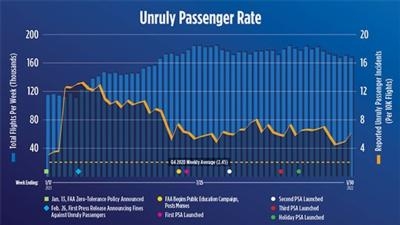Tue, Feb 22, 2022
"Attendants Continue to Face Physical and Verbal Abuse, Cannot Sit by and Allow Offenses" Says APFA
The issue of exactly how far the industry should go to punish disruptive airline passengers has been the subject of considerable disagreement between a bevy of sociopolitical commentators and industry stakeholders, after a solid 2-year increase in incidents causing problems throughout the transportation network.

The Association of Professional Flight Attendants has joined the chorus of industry voices pushing for disruptive passengers to be placed on the no-fly list, essentially blacklisting them across any commercial aviation services. In their statement, they say the move stems from concern "for the safety of our passengers and crew and never know what to expect when the aircraft takes off. The position of our Union has been clear and consistent: We must ensure these offenders face prosecution to the full extent of the law with appropriate fines, criminal penalties, and applicable flying bans."
Unruly-passenger incidents reported to the FAA have risen sharply since 2020, thought to be brought on by a series of societal shifts and stressors innate to post-pandemic travel. Under the FAA's new zero-tolerance policy, offenders who are cited for breaching federal regulations in-air are shunted direct to civil penalties up to $37,000 per violation, moving past counseling requirements or warnings as it did before the change. The no-fly list is controversial to some, given the apparent inability to restore flight rights for those placed on it in addition to the typical error-prone, bureaucratic inefficiency inherent to such databases.

It is notable that some Senators have opposed the measure as too far-reaching, despite having constituencies with "large numbers of American Flight Attendants at crew bases in Dallas, Ft. Worth, and Miami," according to the association. They make mention of Texas and Florida senators that "sent a letter to DOT Secretary Buttigieg in opposition to the creation of a federal “no-fly” list, leaving our crews at risk." Given the somewhat widespread industry support, like the recent comments by Delta CEO Ed Bastian in support of the measure, it could see implementation in the near future should disruptive passenger rates continue to rise.
More News
He Attempted To Restart The Engine Three Times. On The Third Restart Attempt, He Noticed That Flames Were Coming Out From The Right Wing Near The Fuel Cap Analysis: The pilot repor>[...]
Make Sure You NEVER Miss A New Story From Aero-News Network Do you ever feel like you never see posts from a certain person or page on Facebook or Instagram? Here’s how you c>[...]
From 2009 (YouTube Edition): Leading Air Show Performers Give Their Best Advice for Newcomers On December 6th through December 9th, the Paris Las Vegas Hotel hosted over 1,500 air >[...]
Aero Linx: NASA ASRS ASRS captures confidential reports, analyzes the resulting aviation safety data, and disseminates vital information to the aviation community. The ASRS is an i>[...]
“For our inaugural Pylon Racing Seminar in Roswell, we were thrilled to certify 60 pilots across our six closed-course pylon race classes. Not only did this year’s PRS >[...]
 NTSB Final Report: Rutan Long-EZ
NTSB Final Report: Rutan Long-EZ ANN FAQ: Turn On Post Notifications
ANN FAQ: Turn On Post Notifications Classic Aero-TV: ICAS Perspectives - Advice for New Air Show Performers
Classic Aero-TV: ICAS Perspectives - Advice for New Air Show Performers ANN's Daily Aero-Linx (06.28.25)
ANN's Daily Aero-Linx (06.28.25) Aero-News: Quote of the Day (06.28.25)
Aero-News: Quote of the Day (06.28.25)




